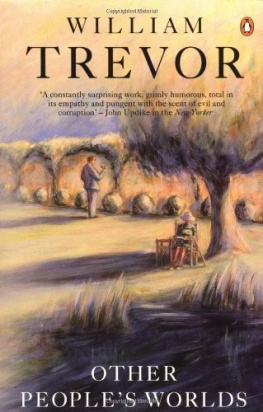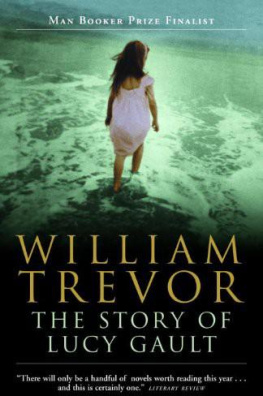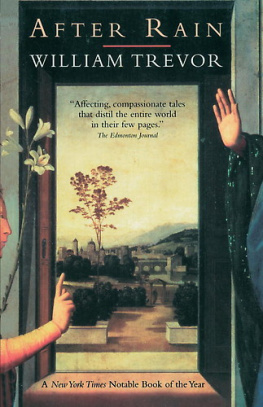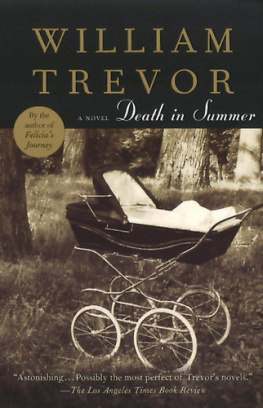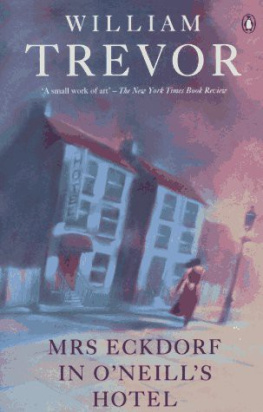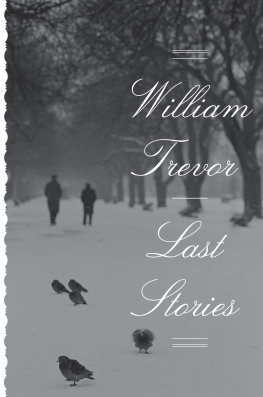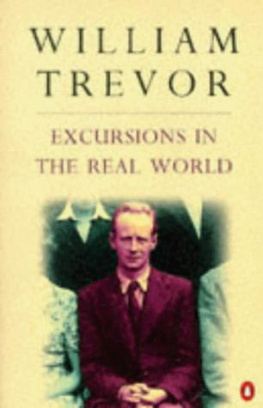William Trevor - Other Peoples Worlds
Here you can read online William Trevor - Other Peoples Worlds full text of the book (entire story) in english for free. Download pdf and epub, get meaning, cover and reviews about this ebook. year: 1991, publisher: Penguin Books, genre: Non-fiction. Description of the work, (preface) as well as reviews are available. Best literature library LitArk.com created for fans of good reading and offers a wide selection of genres:
Romance novel
Science fiction
Adventure
Detective
Science
History
Home and family
Prose
Art
Politics
Computer
Non-fiction
Religion
Business
Children
Humor
Choose a favorite category and find really read worthwhile books. Enjoy immersion in the world of imagination, feel the emotions of the characters or learn something new for yourself, make an fascinating discovery.
- Book:Other Peoples Worlds
- Author:
- Publisher:Penguin Books
- Genre:
- Year:1991
- Rating:3 / 5
- Favourites:Add to favourites
- Your mark:
- 60
- 1
- 2
- 3
- 4
- 5
Other Peoples Worlds: summary, description and annotation
We offer to read an annotation, description, summary or preface (depends on what the author of the book "Other Peoples Worlds" wrote himself). If you haven't found the necessary information about the book — write in the comments, we will try to find it.
Other Peoples Worlds — read online for free the complete book (whole text) full work
Below is the text of the book, divided by pages. System saving the place of the last page read, allows you to conveniently read the book "Other Peoples Worlds" online for free, without having to search again every time where you left off. Put a bookmark, and you can go to the page where you finished reading at any time.
Font size:
Interval:
Bookmark:
OTHER PEOPLE'S WORLDS
William Trevor was born in Mitchelstown, Co. Cork, in 1928, and spent his childhood in provincial Ireland. He attended a number of Irish schools and later Trinity College, Dublin. He is a member of the Irish Academy of Letters.
Among his books are The Old Boys (1964), winner of the Hawthornden Prize, The Boarding House (1965), The Love Department (1966), Mrs. Eckdorf in O'Neills Hotel (1969), Miss Gomez and the Brethren (1971), Elizabeth Alone (1973), The Children of Dynmouth (1976), winner of the Whitbread Award, The Distant Past (1979), Other People's Worlds (1980), Fools of Fortune (1983), winner of the Whitbread Award, A Writer's Ireland (1984), The Silence in the Garden (1988), winner of the Yorkshire Post Book of the Year Award, and Two Lives (1991), which was shortlisted for the Sunday Express Book of the Year Award and includes the Booker-shortlisted novella Reading Turgenev. Many of his books are published by Penguin. His collections of short stories are The Day We Got Drunk on Cake (1967), The Ballroom of Romance (1972), Angels at the Ritz (1975), winner of the Royal Society of Literature Award, Lovers of Their Time (1978), Beyond the Pale (1981), The News from Ireland (1986) and Family Sins (1989), all of which are published by Penguin in Collected Stories, together with four stories not included in previous collections. He has published a collection of autobiographical essays, Excursions in the Real World (1993) and is the editor of The Oxford Book of Irish Short Stories (1989). He has also written plays for the stage and for radio and television. Several of his television plays have been based on his short stories. In 1976 Willie Trev or received the Allied Irish Bank s' Prize, and in 1977 was awarded an honorary CBE in recognition of his valuable services to literature. In 1992 he received the Sunday Times Award for Literary Excellence.
WILLIAM TREVOR
OTHER PEOPLES WORLDS
First published in Great Britain by The BodleyHead 1980 First published in the United States of America by The Viking Press 1981 Published in Penguin Books
Copyright William Trevor, 1980 All rights reserved
To Jane
- -
Julias
All over the Gloucestershire countryside the poppies that summer were delicate on sunny banks, cow parsley and campion profuse. The japonica bloomed as it hadnt for years in the garden of Swan House, as if already celebrating the wedding there was to be. It was not Henrietta Ferndale of that house, nor her sister Katherine, who intended to marry, although both had reached marrying age: it was their mother Julia, an army officers widow for almost exactly nine years. But Henrietta and Katherine, both of whom had left the small town of Stone St Martin for the greater excitements of London, were delighted about the coming event; so was Anstey, Julias mother, who lived with her in Swan House; and Mrs. Spanners, who came to clean it once a week.
Most delighted of all was Julia herself, who on a warm Wednesday afternoon was one of four women pinkly draped in Stone St Martins Crowning Glory Salon. Simon, who ran the place - the best friend of Arthur, who had the flower-shop next door - spared a moment for all the ladies, while attending himself to old, deaf Anstruther, who never missed her Wednesday appointment in the Crowning Glory. There was another salon in Stone St Martin, cheaper by quite a bit, but reputed to be dirty.
Such weather, Mrs. Ferndale! Diane remarked, and when Julia murmured a reply the girl went on to speak about her parents opinion of her boyfriend, Nevil Clapp. I mean, she finished up eventually, theyre not being fair.
The hair that Diane snipped at was short and brown, with quite some grey in it. Faint little lines had begun to blink around Julias eyes, coming or going with changes of expression or mood; a few faint freckles had always been just visible on her forehead. At
forty-seven her round face was not yet empty of the beauty that had once distinguished it: now and again it echoed in her smile, or in the depths of her blue-green eyes. Her mother had once said that Julia had a look of a Filippo Lippi madonna, a similar delicacy in profile, the same reddish tinge in her hair. But there was plumpness now as well: Julias daughters had stolen the madonna look.
Im sorry, she said in reply to Dianes protest about the unfairness of her parents, and yet felt sympathy for them. Parental doubt was understandable, since Nevil Clapp was currently on probation after the thieving of a car battery and other items from the Red Robin filing station. He was now working in the Orchard Motel on the Cheltenham road, having sworn to a bench of magistrates that he had turned over a new leaf.
First thing my dad said was Nevils a criminal. And Mum was I pregnant?
Julia tried to nod. She knew a lot about Dianes life, being by nature a listener, but this afternoon she found it hard to concentrate.
Id never get pregnant, Mrs. Ferndale. I didnt know where to look when Mum said it.
Parents do worry, Julia said, hoping she wasnt sounding vague.
It still seemed extraordinary to her that she was to marry again, that she had fallen so completely and so passionately in love with a man who was fourteen years younger than she was. It seemed extraordinary that she no longer belonged in the shadows cast by her daughters and her mother, for since Roger Ferndales death she had become used to occupying the background, though not unhappily. In the yard of a barracks near Berlin he had fallen from his horse and was later discovered to be dead. There had been no history of heart trouble, but a heart attack had appeared to be the cause of death. Some kind of blackout, Mrs. Ferndale, a military doctor had informed her, bewildered himself and unwilling to be more precise. The funeral had been grimmer than it might have been because of the military honours, and the return to England bad collected an extra note of finality because it was the end of army
life, of all the trekking about there had been, married quarters in Germany and Malaya, in Africa and Singapore. Coding home, Julia had settled into Swan House and the doziness of Stone St Martin. It was the house her mother had moved to when years ago she had sold Ansteys Mill, a grander residence, outside the town; it was where Henrietta and Katherine had often spent their school holidays when their parents were abroad; and it seemed the natural place for Julia in her unexpected widowhood. Reduced in circumstances, she had set about making ends meet by typing legal documents for a firm of solicitors in the town, Warboys, Smith and Toogood. She did so still, working at home on an antiquated Remington, in the kitchen or the drawing-room, whenever she had a moment. Over the years the payments she received had enabled her to employ Mrs. Spanners and, until his retirement a month ago, to have old Mr. Pocock on Saturday mornings to help with the heavy work in the garden. In spite of the loneliness which had replaced a contented marriage, she considered that good fortune had not deserted her.
You know what I mean, Mrs. Ferndale?
Yes, of course.
The conversation had changed. Julia was told about the plans of Dianes sister to become a physiotherapist, but again she found concentration difficult. I thought you might be a Catholic, Francis Tyte had said, early in their relationship, delighting her when he confessed that he was one himself. For many generations the Ansteys had been a Catholic family; Julia had been sent to St Mildreds Convent near Stratford-upon-Avon and had later carried the family tradition on. She was not devout, but had never been able to think of life without God, without the sacraments and the mass. Her daughters had gone to St Mildreds also, though they had afterwards abandoned religion with an ease that had distressed her at the time. Roger Ferndale bad not shared her faith, nor did her mother: it seemed like a treat, plucked out of nowhere, when Francis made his revelation.
Font size:
Interval:
Bookmark:
Similar books «Other Peoples Worlds»
Look at similar books to Other Peoples Worlds. We have selected literature similar in name and meaning in the hope of providing readers with more options to find new, interesting, not yet read works.
Discussion, reviews of the book Other Peoples Worlds and just readers' own opinions. Leave your comments, write what you think about the work, its meaning or the main characters. Specify what exactly you liked and what you didn't like, and why you think so.

